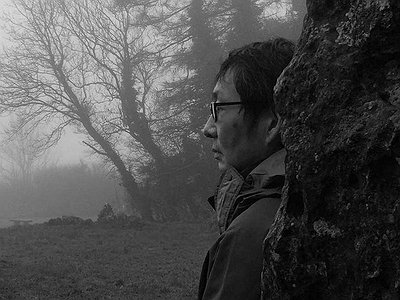Name: Ken Ikeda
Nationality: Japanese
Occupation: Composer, performer, improviser
Current release: Ken Ikeda joins Eddie Prévost, Massimo Magee, and Joshua Weitzel for their collaborative release Easter Monday Music, available April 8th 2022 via 577.
Over the course of his career, he has also collaborated with artists like Toshimaru Nakamura, Chihei Hatakeyama, and David Toop.
[Read our Eddie Prévost interview]
[Read our Takatsuki Trio Quartett interview, which includes Joshua Weitzel]
[Read our Massimo Magee interview]
[Read our David Toop interview]
[Read our Toshimaru Nakamura interview]
If these thoughts by Ken Ikeda piqued your interest, visit his bandcamp profile for more music.
What, would you say, are the key ideas behind your approach to improvisation? Do you see yourself as part of a tradition or historic lineage?
I think that most ritualistic music since ancient times was originally started by improvisation.
The history of Western music is quite different in this regard, because the music score is very important in Europe. Maybe there are religious reasons for this development, especially after the Baroque period.
Most other traditional forms of music still rely heavily on improvisation, for example African drums, Indian raga, gamelan in Indonesia. Free music is quite traditional and historic.
What was your own learning curve / creative development like when it comes to improvisation - what were challenges and breakthroughs?
I'm not a typical free jazz soloist, I'm always looking to create a different space and ambiance.
If you compare performing to a movie, I think the typical soloist is like the main actor in the spotlight. But maybe I'm rather like a kind of a stage designer or the cameraman.
Space, landscape, ambiance, and atmosphere are more important than harmony or melody lines for me.
Tell me about your instrument and/or tools, please. How would you describe the relationship with it? What are its most important qualities and how do they influence the musical results and your own performance?
I was an electric bass player when I started learning music in Japan. I didn't realize that most of Asian contemporary music forgot about history and westernized too much. I started wondering why I always make music as in Western history.
And then when I listened the prepared piano by John Cage for first time, it felt very familiar to me (it actually sounds like Asian percussion for me).
With that as a trigger, I stopped playing bass guitar and became a synthesist because I had to use an instrument without history.
How do you feel your sense of identity influences your collaborations? Do you feel as though you are able to express yourself more fully in solo mode or, conversely, through the interaction with other musicians? Are you "gaining" or "sacrificing" something in a collaboration?
I'll use the same comparison to a movie which I mentioned earlier, where I said that I see myself as a stage designer with regards to my solo performances: I use lights, furnitures, cameras for only myself.
But when I collaborate with someone else, I'm influenced so much by the other musicians, because other "actors" change the landscape and it leads me to create other kind of space and ambiance.
For you personally, how would you describe the relationship between a clear individual vision and cooperative results?
It's completely different work.
Playing solo is my main outlet. But I'm always learning from other musicians and artists.
How do you see the relationship between sound, space and performance and what are some of your strategies and approaches of working with them?
Honestly, electric instruments are heavily influenced by sound systems, depending on natural echoes from the room, the quality of PA speakers and even the taste of the sound engineer.
There is a Zen saying:
"The straight mind is the way-place". [also occasionally translated as: "The straight mind is the Pure Land" or "Straightforward mind is the Dojo"90].
It means that the best meditation room is within yourself. You don't have to be in an old temple or anything similar. The music spirit is always inside of you.
In a way, improvisations remind us of the transitory nature of life. What, do you feel, can music and improvisation express and reveal about life and death?
I sometimes imagine the sound that might have accompanied the funerals of Neanderthals more than ten thousand years ago. They absolutely used sound and performance, because humans can not express life and death using only words.
Singing (screaming?) and making noise with stones, wood or water feeling the spirit of the human body – these, I think, are the roots of music. Of course, all of this took place without scores, chord progressions, composers, or conductors. It was completely without hierarchy - like a free improvisation.




